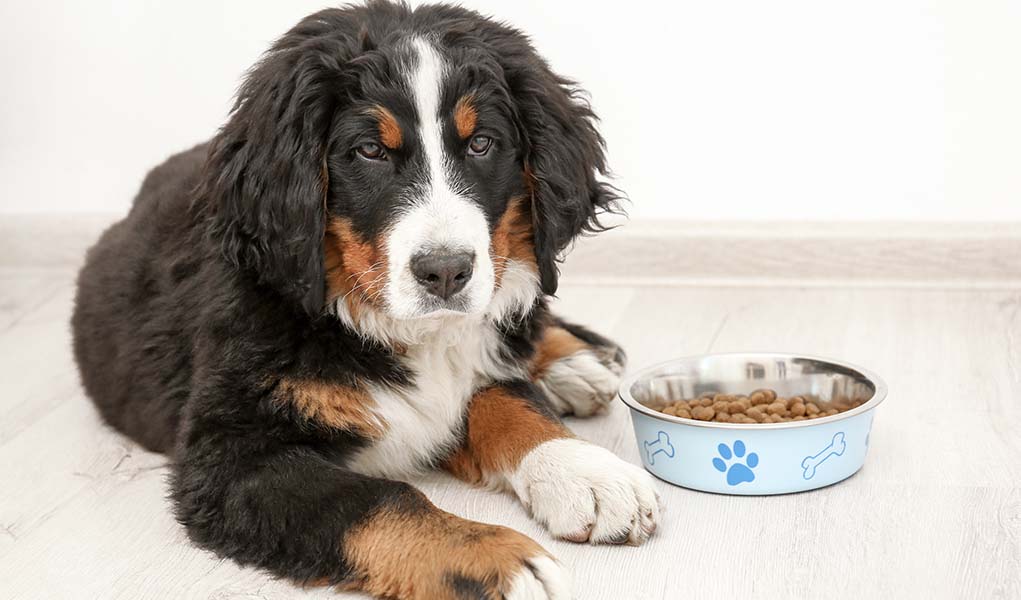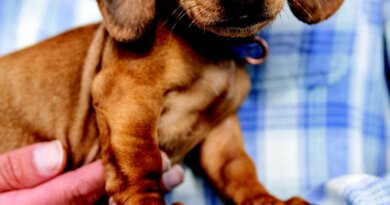Bernese Mountain Dog Breed Profile – Top Dog Tips
Friends and folks, from the farmlands of Switzerland, I present you the Bernese Mountain Dog!
If you’re looking for a watchdog that is a loyal companion, the Bernese Mountain Dog might be the breed for you. Bernese mountain dogs are alert, good-natured, and eager to please, making them great as family pets.
These dogs came from the Canton of Bern, thus their name. These breeds are known for being friendly and calm.
Bernese Mountain dogs are great watchdogs. However, they also tend to bark loudly.
Also, keep in mind that they love to chase around smaller animals when they play and things can get a little bit rough.
But with proper training and socialization, a fully mature Bernese Mountain dog can be pretty gentle.
Before adopting this kind of breed or any breed, in particular, make sure that you can match their energy, provide the required space, keep up with grooming, and save time for training.
With all of these being said, a well-trained Bernese will give you unconditional love and loyalty.
This breed might be one of the friendliest dogs when properly trained.
If you’re planning to buy a Bernese, it’s best advised to look for a reputable breeder or research rescue groups specifically for this breed.
Bernese Mountain Dog Breed History
As we’ve discussed earlier, the Bernese Mountain dog originated in Switzerland around the city of Berne.
Now for their history, it is believed that the four Swiss Sennenhund breeds (Berner Sennenhund, Appenzeller Sennenhund, Entlebucher Sennenhund, and Greater Swiss Mountain Dog) are developed as a cross breed between farm dogs from the Swiss Alps and mastiff-type dogs that were brought by the Romans when they invaded the Alps in the first century B.C.
Molosser is one of the ancient mastiff-type dogs that stand out. They are the most versatile and well-traveled dogs.
Also, Bernese Mountain Dogs may have been working on Swiss farms for over 2,000 years! Their work can range from pulling carts, accompanying livestock, becoming watchdogs, and providing their people companionship.
Way back in 1888, about 36% of the Swiss population works in Agriculture. And if you’re working in Agriculture, you’ll need a dog that could herd cattle and is strong enough to pull carts full of goods.
However, by the end of the 1800s working dog breeds have lost their popularity due to machines replacing them for their work.
But in the year 1899, the Swiss became curious about preserving their native breeds. This is where they found a dog club called Berna. Group members from Berna are breeders of a wide variety of purebred dogs.
This dog breed has gain popularity in the early 1900s when they were exhibited at dog shows.
A key highlight was when an international dog show, sponsored by the Swiss dog club, was held in Bern. This is when the Swiss Kennel Club recognized the Bernese Mountain Dog as a breed.
AKC Recognized Breed
Furthermore, Berners first arrived in the United States in the early 1900s after the first World War. But they were still not yet to be recognized by the Americal Kennel Club.
On the other hand, two British breeders started to import Berners, and the first litter of Berner puppies was born in England.
In 1936, the female Berner was imported from the Glen Shadow Kennel in Louisiana and the male Berner came from Switzerland.
The AKC sent a letter to Glend Shadow saying that the Bernese Mountain Dog has now been recognized as a new breed in the Working Class division in the next year.
In addition, the Bernese Mountain Dog Club of America was founded in 1968. They had 62 members and 43 registered Berners back then. But after three years, there were more than 100 members of said club.
In 1981, the Bernese Mountain Dog Club of America became a member club of the AKC. And in 1990, the AKC embraced its existing Bernese Mountain Dog standard.
Physical Characteristics of the Bernese Mountain Dog
Height and Weight
Next, let’s tackle their physical sizes. On average, male Berners stand about 25 to 28 inches tall at the shoulder and they weigh about 80 to 115 pounds.
On the other hand, females stand 23 to 26 inches tall at the shoulder while weighing 70 to 95 pounds on average.
But all of these depend on the Berner that you adopted. Some may be smaller while some may be larger.
Coat Color
Bernese Mountain Dogs have beautiful, flashy, and tricolor coats. These colors range from black or brown to chocolate, and liver or white. They have a thick double coat; a longer outer coat, and a wooly undercoat.
Even though their coat is tricolored, their body is covered with jet-black hair with rich rust and white.
Most Berners have a white marking on the chest that looks like an inverted cross. They also commonly have a white blaze between their eyes and the color white on the tip of their tail.
Bernese Mountain Temperament
One of the reasons why the Bernese Mountain Dog breed is so popular is because of its temperament. Berner’s eagerness to please their owners has charmed people since the 1800s.
Berners are smart, quick learners, and very loyal dogs. They love to have plenty of downtime with their people. They can play with you in the backyard and can also be your cuddle buddy on the couch.
The Bernese Mountain Dog has an instinct to guard since they were working dogs many years ago. These dogs are good watchdogs but can also bark loudly. They also do great at herding and draft work.
But also keep in mind that their behavior is affected by numerous factors like their heredity, training, and socialization. Puppies with nice temperaments tend to be more playful and they are willing to make friends with other people.
A great tip for people who are planning to adopt a Berner is that meet and spend time with the puppy first.
Another tip is also meeting their parents so you can feel the possibilities of what kind of dog will they be like when they grow up.
Living with a Berner
Berners are best suited for a large home with a secured fenced yard and they love to spend time with their people. So if you’re living in the city and will always be at work, this dog might not be the dog for you.
Also, these dogs are best for cold climates because of their thick coat. They love to play in the snow.
But because of their thick black coat and their large size, they’re prone to heat stroke. Make sure to keep them cool during the daytime with a fan or even keep them stayed in an airconditioned room.
Also, this is why it is best advised to exercise your Berner early in the morning or at night when it’s cooler.
Now you might be asking, is exercise required for this dog breed? Yes, it is!
Exercise
Berners have a moderate energy level and their big bodies need a reasonable amount of exercise.
Since the Bernese Mountain Dog is a working dog, they have a lot of energy. Berners will be needing a minimum of 30 minutes of daily moderate to vigorous exercise.
You can try brisk walks, hikes, and games of fetch. Also, Berners are athletic dogs.
You can sign them up for dog sports. For instance, with proper training, they can compete in obedience, agility, tracking, and carting.
With this, you’ll also be able to challenge them not just physically, but also mentally.
Bernese Mountain Dog Training
Berners are smart and they can learn things quickly. Fortunately, they also love the challenge of learning new things!
If you’re planning to adopt a Berner, obedience training is essential. Why? Well, early obedience training can help them make the best household companions, especially with their large size.
Like any other dog, the Bernese Mountain Dog needs early socialization. Expose them to different people, sights, sounds, and experiences.
Try and plan out an activity in your free time for them to explore. Socialization can help you make sure that your pup grows up to be an all-around good boy.
In addition to socializing, you can also enroll your Berner puppy in a puppy kindergarten class. Invite different people to your home, take walks in a busy park, and let them meet your neighbors to help polish their social skills.
Diet
When it comes to the Bernese Mountain Dog’s nutritional needs, there are a lot of factors that play a part. This includes their current weight, energy level, age, and their overall health condition.
It is best advised to consult with your vet or a proper pet nutritionist to make sure that you’ll be giving the right amount of dog food to your Berner.
On the other hand, here are some of our recommendations on the best dog food for Bernese Mountain Dogs.
Best Dog Food for Bernese Mountain Puppies
Best Dog Food Adult Bernese Mountain Dogs
Best Dog Food for Senior Bernese Mountain Dogs
Grooming of the Bernese Mountain Dog Breed
Unfortunately, the Bernese Mountain Dog is a shedder. They tend to shed moderately all year long! But they shed the most in spring and fall.
It is advised to brush your Berner several times a week to help reduce the amount of hair all over your home. It also keeps the coat clean and tangle-free.
In addition, you can bathe your Berner once every three months to maintain its clean appearance.
When it comes to toothbrushing, brush your dog’s teeth at least two to three times a week. This will remove tartar buildup and eliminate any bacteria that are lurking inside.
But if you love your Berner so much, daily brushing is also good to prevent gum disease and bad breath.
Nail trimming is very important. Trim your Berner’s nails once a month to prevent painful tears and other issues.
When you start to hear their nails clicking on the floor when they’re walking, it means their nails are too long and need trimming.
Regularly check their ears for redness or a bad odor, which can suggest an infection.
If you see redness, tenderness, or inflammation on the skin, it is a good indicator of a potential infection. Damp a cotton ball with a pH-balanced ear cleaner and gently wipe it to their ears.
All in all, you should also check for signs of infection not just on their ears. Check for sores or rashes in their skin, nose, mouth, eyes, and feet.
Health
Generally, the Bernese Mountain Dog is a healthy dog breed. But just like any other breed, Berners are prone to certain types of disease.
Remember that not all Berners will get these diseases, but as the dog owner, you have to be prepared and aware of these things if you’re considering adopting a Bernese Mountain Dog.
Here are a few health problems that you should look out for:
Hip Dysplasia
There are a lot of large dog breeds prone to Hip Dysplasia, and one of them is the Bernese Mountain Dog breed. This is a hereditary condition in which the thighbone does not fit into the hip joint.
Monitor your Berner and look out for signs of hip problems.
For instance, check out if your dog has decreased their activity, has a problem standing up, has lameness in the hind end, has problems jumping or climbing stairs, and bunny hopping.
Elbow Dysplasia
Similar to hip dysplasia, this condition is also common in large dog breeds. It is caused by abnormal growth and development, which will be the result of a malformed and weak joint.
Treatment for this condition includes surgery, weight management, medical management, and anti-inflammatory medication.
Cancer
Unfortunately, there are a lot of Berners affected by various forms of cancer.
Look out for abnormal swelling of a sore or a bump, sores that don’t seem to heal, difficulty in breathing, and bleeding from any body opening.
Treatment will not be cheap as it includes chemotherapy, surgery, and other medications.
Progressive Retinal Atrophy
Progressive Retinal Atrophy or PRA is an eye condition that slowly leads to blindness. This eye problem is one of the hardest to spot due to its lack of symptoms.
In the early stages of this condition, your dogs become night-blind and they will slowly lose their sight even in the daytime.
If you notice your dog tripping over things and bumping into furniture they usually don’t, then it would be best to rush your pup to the vet for further examination.
Frequently Asked Questions about the Bernese Mountain Dog Breed
How long do Bernese mountain dogs live?
Usually, Berners’ lifespan ranges from 6 to 7 years only.
Since the Bernese Mountain Dog is a larger dog breed, their overall lifespan is usually shorter than small dog breeds.
Also, there are certain health conditions (like the ones we’ve discussed above) that can factor in their lifespan.
Can a Bernese Mountain Dog be left alone?
It is not recommended to leave your Bernese Mountain Dog alone at home. However, with enough exercise and proper mental stimulation, they can be left alone for five to eight hours only.
Without these things, Berners will most likely develop destructive behaviors or excessively bark when they are alone or lonely.
Is a Bernese Mountain Dog a good family dog?
Yes! Berners are excellent family dogs. They are known to be affectionate and good-natured. Berners are also believed to be one of the least aggressive dogs towards humans.
They are also great guard dogs and do well with children.
Bernese Mountain Dog Breed Summary
If you’re a fan of large-sized dog breeds that are very loyal and affectionate, I would recommend adopting a Bernese Mountain Dog puppy.
Berners are excellent family dogs as they are good with children and great as watchdogs.
They are big, powerful, and built for work. However, they also love to just cuddle up and spend time with their owners because of their sweet and affectionate nature.
Berners are also easy to train due to their intelligence and eagerness to please. With the proper training, they can shine through dog sports like agility, tracking, and carting.
If you’re planning to adopt a Berner, make sure that you’ll be able to match their energy, do the required exercise, train them, feed them the best quality food, and regularly go to vet checkups to ensure that they’ll be living their best and happy life.
RELATED: CAVAPOO DOG BREED PROFILE
Related












Actual trends of drug. Medicament prescribing information.
https://edonlinefast.com
Actual trends of drug. Read now.
Long-Term Effects. Commonly Used Drugs Charts.
https://edonlinefast.com
Some trends of drugs. Some are medicines that help people when doctors prescribe.
Medscape Drugs & Diseases. Definitive journal of drugs and therapeutics.
https://tadalafil1st.com/
Drugs information sheet. Read here.
motilium tablets uk
cheap kamagra https://kamagra.icu/# – Kamagra 100mg